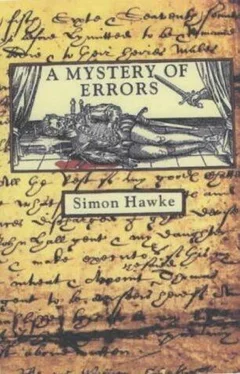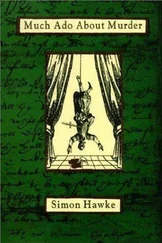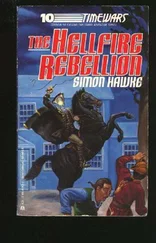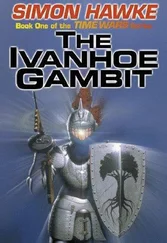Simon Hawke - A Mystery Of Errors
Здесь есть возможность читать онлайн «Simon Hawke - A Mystery Of Errors» весь текст электронной книги совершенно бесплатно (целиком полную версию без сокращений). В некоторых случаях можно слушать аудио, скачать через торрент в формате fb2 и присутствует краткое содержание. Жанр: Исторический детектив, на английском языке. Описание произведения, (предисловие) а так же отзывы посетителей доступны на портале библиотеки ЛибКат.
- Название:A Mystery Of Errors
- Автор:
- Жанр:
- Год:неизвестен
- ISBN:нет данных
- Рейтинг книги:3 / 5. Голосов: 1
-
Избранное:Добавить в избранное
- Отзывы:
-
Ваша оценка:
- 60
- 1
- 2
- 3
- 4
- 5
A Mystery Of Errors: краткое содержание, описание и аннотация
Предлагаем к чтению аннотацию, описание, краткое содержание или предисловие (зависит от того, что написал сам автор книги «A Mystery Of Errors»). Если вы не нашли необходимую информацию о книге — напишите в комментариях, мы постараемся отыскать её.
A Mystery Of Errors — читать онлайн бесплатно полную книгу (весь текст) целиком
Ниже представлен текст книги, разбитый по страницам. Система сохранения места последней прочитанной страницы, позволяет с удобством читать онлайн бесплатно книгу «A Mystery Of Errors», без необходимости каждый раз заново искать на чём Вы остановились. Поставьте закладку, и сможете в любой момент перейти на страницу, на которой закончили чтение.
Интервал:
Закладка:
According to Shakespeare, Marlowe was the most promising young poet of the day and, with Tamburlane, he had served notice upon the players’ world that a change was in the air. The production had shocked and thrilled audiences with its lyrical bombast and lurid violence, reminiscent of the Greek classics, and in contrast, the broad jests and prancing jigs and ribald songs performed by other companies seemed suddenly dated and low class. At least, this was the opinion Shakespeare held. Smythe had actually enjoyed the ribald jests, the funny jigs, and the bawdy songs, and wasn’t at all sure that something serious and weighty would be preferable. After all, despite Marlowe’s education, university men did not constitute the bulk of the audience and the Theatre was not the Inns of Court, where productions were often staged in Latin by amateur barristers who would one day argue the law before the bench. Nevertheless, Shakespeare seemed convinced that Marlowe’s work, as notorious as the man himself, heralded a new sort of drama, one that would cater more to the talents of serious actors such as Edward Alleyn and less to lowbrow jesters like Will Kemp. The days of the prancing clown, Shakespeare had insisted, were over. Of course, it was also possible that Shakespeare was exaggerating, just as he had exaggerated the nature of their relationship with Marlowe and Sir William, which was why Dick
Burbage had helped them with securing lodgings and given them both jobs.
“You know, one would think that friends of Sir William Worley and Kit Marlowe would deserve rather better than to be given jobs as ostlers,” Shakespeare said, irritably.
“Well, for one thing, Will, we are not, in fact, friends of Sir William’s and Mr. Marlowe’s. We can only claim, at best, the briefest acquaintance with them. Quite aside from that, Mr. Burbage did not have to give us jobs at all, you know. And perhaps, under present circumstances, these were the only openings he had available. I am certain that, given an opportunity to demonstrate what we can do, we shall be able to advance ourselves in due course.”
Shakespeare sighed. “I suppose you’re right. There is a strongly practical streak about you, Tuck, which will doubtless serve you well. But I fear that I am not as patient as you are. I know what I am capable of doing, and I know where I wish to be, and on top of all that, I still have a family to support. And I am not going to be able to provide for them on an ostler’s pay.”
“I shall help you, Will. After all, you have helped me, from the moment we first met, and I would not now have the lodgings that we share if you did not advance the lion’s share of the rent. I shall not forget that.”
“You are a good soul, Tuck. And I, for my part, shall remember that, as well. Aha, look there…” He pointed toward the road that led across the field. “A coach and four approaches. Let’s run and get that one, it positively drips with money. The owner must be a wealthy merchant or a nobleman. Pray for the nobleman, for merchants give miserly gratuities.”
“ ‘Tis a nobleman, I think, or a proper gentleman, at least,” said Smythe, as the coach drew nearer. “Methinks I see an escutcheon emblazoned on the door.”
“Indeed,” said Shakespeare. “But soft… I have seen those arms before, I think.”
“As I have seen that team!” said Smythe. “ ‘Tis that same high-handed rogue who almost ran us down the other day! Well, I shall have a thing or two to say to him!”
“No, Tuck, wait!” Shakespeare reached out to grab his arm, but he was too late. Smythe was already running toward the coach. “Oh, God’s bollocks! He’s going to get himself killed.” He started running after Smythe.
The driver found nothing at all unusual in the sight of two ostlers running toward his coach as he pulled up to the Theatre, so he reined the team in to a walk as he pulled up in front of the entrance. As the coach came rolling to a stop, Smythe ran up to it, with Shakespeare pursuing in a vain attempt to catch him. He reached out and yanked the door open.
“Damn it, sir! I’ll have you know…”
Fully prepared to unload a torrent of enraged invective on the occupant, Smythe was suddenly brought up short. To his surprise, it was not the man he thought.
It was not even a man.
He stared, struck speechless, at the most beautiful woman he had ever seen.
She gazed back at him, then raised her eyebrows in an interrogative manner. “Do you always damn people so vehemently upon such short acquaintance?”
He flushed and looked down, sheepishly. “Forgive me, milady. I… I thought you were someone else.”
“I see. And how, pray tell, did you happen to come to this conclusion?”
“I… well, ‘tis of no consequence, milady. Forgive me. I did not mean to offend.”
“You will offend me, sir, if you act as if my question were of no consequence. I would like an answer.”
“ ‘Twas the coach, milady,” said Shakespeare, from behind him. “This coach… or perhaps I should say, to be more precise, one very much like it… nearly ran us down the other day.”
“And so your friend is justifiably incensed,” she said. “I quite understand. But as this is not my coach, and I am only riding in it for the first time today at the invitation of Mr. Anthony Gresham, perhaps I could be spared your umbrage and assisted to step out?”
“Why, yes, of course, milady,” Smythe said. He reached out to her and she took his hand as he helped her step down out of the coach. She squeezed his hand and, for a moment, their eyes met. Smythe felt a sudden, intense pressure in his chest and his mouth went dry. Was there meaning in that glance? He could have sworn that something passed between them, something pregnant with tension and desire. But surely, he thought, that could not be possible. Could it?
“Miss Elizabeth Darcie?”
They turned to see a liveried servant standing behind them, and Smythe at once recognized the man from the inn at the crossroads, the one who had come galloping ahead to announce that they’d been robbed. The other man, however, seemed not to recognize him. Indeed, Smythe thought, why should he? A mere ostler was beneath even the notice of a servant.
“I am Drummond, milady. Mr. Gresham’s man. I am to escort you to his private box to join him for the performance.”
“Certainly,” she said. And then she paused and turned back to Smythe. “And thank you so much for you assistance, Mr…?”
“Smythe, milady. Symington Smythe.”
“He’s just an ostler, milady,” Drummond said, in a tone that clearly indicated she had no need to bother with anyone so insignificant.
“Aye, but a very handsome one,” she said, with a wink at Smythe.
Drummond looked scandalized and did his best to rush her off through the theatre entrance before there could be any further exchange between them. Smythe stared after them for several moments before he finally realized that the coachman was giving him instructions for what he wanted done. The horses were to be unhitched and given some hay in the paddock, then watered and brushed and hitched back up in their traces once again in time for Mr. Gresham and his guest to leave in a timely manner as soon as the production ended. Smythe knew what needed to be done and wasn’t really paying very close attention. He could not get his mind off Miss Elizabeth Darcie, and how she had winked at him and said that he was handsome.
“Do not even think about it,” Shakespeare said, as they were unhitching the team.
“Think about what?”
“Oh, please! Spare me the coy innocence. That Darcie woman, that’s what. And pray do not tell me that you were not thinking about her. I could feel the heat coming off you from six feet away.”
Читать дальшеИнтервал:
Закладка:
Похожие книги на «A Mystery Of Errors»
Представляем Вашему вниманию похожие книги на «A Mystery Of Errors» списком для выбора. Мы отобрали схожую по названию и смыслу литературу в надежде предоставить читателям больше вариантов отыскать новые, интересные, ещё непрочитанные произведения.
Обсуждение, отзывы о книге «A Mystery Of Errors» и просто собственные мнения читателей. Оставьте ваши комментарии, напишите, что Вы думаете о произведении, его смысле или главных героях. Укажите что конкретно понравилось, а что нет, и почему Вы так считаете.












